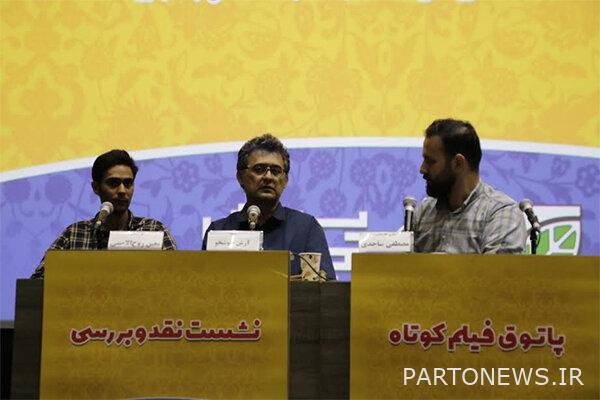When film engineering bothers the audience/ a tip from Farhadi cinema

The 8th episode of the 7th season of Short Film Hangout was held at Charso Film Campus.
Charso Press: In the eighth round of the short film hangout, the short fiction films “Leo” directed by Moeen Roohul Amini, “Insomnia” directed by Reza Jamali, “Grape Season” directed by Behrouz Khorram and the short animation “Drekht Tarsh” directed by Akbar Tarabpour were screened with the presence of Arash Khushkho was reviewed as a guest critic.
At the beginning of this meeting, the director of “Leo” Moin Rohol Amini explained about his work: The idea of the film came from the combination of a true story that I had heard and a story that I had about immigration. The film was shot in Kashan and its actors are Arabic-speaking. We worked with the actors for 4-5 months so that our other actor could learn Arabic with the correct accent.
This young director also pointed to the simplicity and non-dramatic nature of “Leo” and said: I did not seek to be seen directing this film while decoupaging it. When I saw that my actor could attract the audience so well, I gave up on cutting and started planning the work. I thought that in this way we can migrate from one view to another like these children.
Rohul Amini added: Basically, I am not looking for stories that are suitable for a feature film and turning them into a short film.
“Leo”; The juxtaposition of dreams and reality
In addition, Arash Khoshkho said regarding “Leo”: the story of this film is the juxtaposition of dreams and reality, which we have seen in many Hollywood films; Like Desica’s good film “Miracle in Milan” (1953), which shows the coexistence of dream and reality. This is a very attractive theme that “Leo” has managed to present well with this little wealth and little time. In “Leo” this juxtaposition of dream and reality takes place between “the hard reality of the story” and “a child in the middle of that hard reality doing something that came out of his dream for another child”.
This film critic added: The next point is the great attention and obsession of the director in paying attention to details in this film despite its shortness. Like the camp tents we see in the background and some little girls playing there. These details make this movie believable and desirable. Remember this same camp in the movie The Clusters of Wrath or even in the old Hollywood movies, for example, it is a cafe, the hero is talking, and in the background a man and a woman are sitting and arguing fiercely, while in the main picture there is nothing at all. They are not visible and we only see a shadow of them. These are the details that make the movie believable. This obvious element in “Leo” makes it acceptable and, among other positive points, a good movie. Overall, in my opinion, Rooh Al-Amini should go beyond this in his next film.
Specially Engineered Situations in “Insomnia”
The short film “Insomnia” by Reza Jamali was the second work that the guest critic criticized in the absence of the director.
Khoshkho said: The film is similar to Hitchcock’s “Window Facing the Courtyard”. Same thing with music, windows and neighbors, but in a poor house. But in “Insomnia” Malat’s work is weak and does not convince the audience. The girl who can’t sleep is strange, the house across the street is constantly playing and recording tapes, and the combination of all these results in the engineering and artificiality of the story, which is more than the viewer expects, and the visual power of this The kind, people-friendly director with a visionary vision is gone.
This film critic continued: The mortar needed by this film is its story, which is very artificial and certain engineered situations have been put together, like Asghar Farhadi’s “Salesman” that the audience says to themselves, can all these parameters be put together so that this Let the story take shape. But in Farhadi’s work, the layout is comprehensive and he does it in a way that these things don’t bother the viewer’s mind too much, but in “Insomnia” this engineering happened much more than necessary and annoys the viewer.
The relationship alone does not drive the film forward
In the continuation of the meeting, the movie “Grape Season” was criticized and analyzed.
Arash Khoshkho explained about “Grape Season”: In my opinion, among these 4 films, “Grape Season” was a head and neck higher. The movie is about relationship and in Iran usually these movies are attractive movies. The script of this movie is influenced by stories known as “boring stories”.
He continued: It is good to point out that Farhadi’s films are also about relationships, but he is such a smart writer and director that he knows that relationships alone do not advance the film, so he always includes a mystery in his works, and the relationship discussion is in the background of the mystery engine. .
“The sour tree; Usual and tasteful
At the end, Khoshkho briefly discussed “Drekht Tarsh” by Akbar Tarabpour and said: “Drekht Tarsh” is a classic animation, which is among the works that are made on the side of children and life against war and soldiers, grenades and cannons. Takes. In terms of making the work, it is usual and tasteful, which was not special for me; This may be due to my lack of animation expertise.

